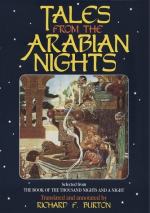to West you would have found no one who could show
you how to obtain the book you seek as well as I can,
for I have dwelt here awaiting your arrival for sixty
years.” “But that was before I was
born,” said Wakhs El Fellat to himself.
He then asked aloud, “By what name did you address
me just now?” “O Saif,” answered
the old man, “that is your true name, for you
are a sword (Saif) to the Abyssinians; but whom do
you worship?” “O my master,” was
the reply, “the Abyssinians worship Saturn (Sukhal)
but I am in perplexity, and know not whom to worship.”
“My son,” replied the old man, “worship
Him who has reared the heavens over us without pillars,
and who has rested the earth on water; the only and
eternal God, the Lord who is only and alone to be
reverenced. I worship Him and none other beside
him, for I follow the religion of Abraham.”
“What is your name?” asked Wakhs El Fellat.
“I am called Shaikh Gyat.” “What
declaration must I make,” he asked the old man,
“to embrace your religion?” “Say
’There is no God but God, and Abraham is the
Friend of God.’ If you make this profession,
you will be numbered among the believers.”
He at once repeated the formula, and Shaikh Gyat was
much pleased, and devoted the night to teaching him
the history of Abraham and his religion, and the forms
of worship. Towards morning he said, “O
my son, whenever you advance to battle, say, ’God
is great, grant me victory, O God, and destroy the
infidels,’ and help will be near you. Now
pursue your journey, but leave your horse here until
your return. Enter the valley before you, under
the protection of God, and after three days you will
meet some one who will aid you.” Wakhs
El Fellat set out on that road, and after three days
he met a horseman who saluted him, and exclaimed,
“Welcome, Saif Zul Yezn, for you bring happiness
to this neighbourhood.” Saif returned his
salutation, and asked, “How do you know me, and
how do you know my name?” “I am not a
brave or renowned warrior,” was the answer,
“but one of the maidens of this country and my
mother taught me your name.” “What
is your name and that of your mother?” “My
mother’s name is Alka,” answered she, “and
I am called Taka.” When he heard this he
was greatly rejoiced, for he remembered that Shaikh
Gyat had said to him, “O thou, whose destiny
will be decided by Alka and Taka.” “O
noble virgin,” said he, “where is your
mother, Alka?” “Look round,” she
replied; and he saw a very large and lofty city at
some distance. “Know,” said she, “that
360 experienced philosophers dwell in that city.
My mother Alka is their superior, and directs all
their affairs and actions. She knew that you
would come to this neighbourhood in search of a book
concerning the Nile, which was written by Japhet, the
son of Noah, and she wishes you to attain your end
by her means. She also informed me of your coming,
and promised me to you, saying, ‘You shall have
no other husband but him.’ We expected you
to-day, and she sent me to meet you, adding, ’Warn




